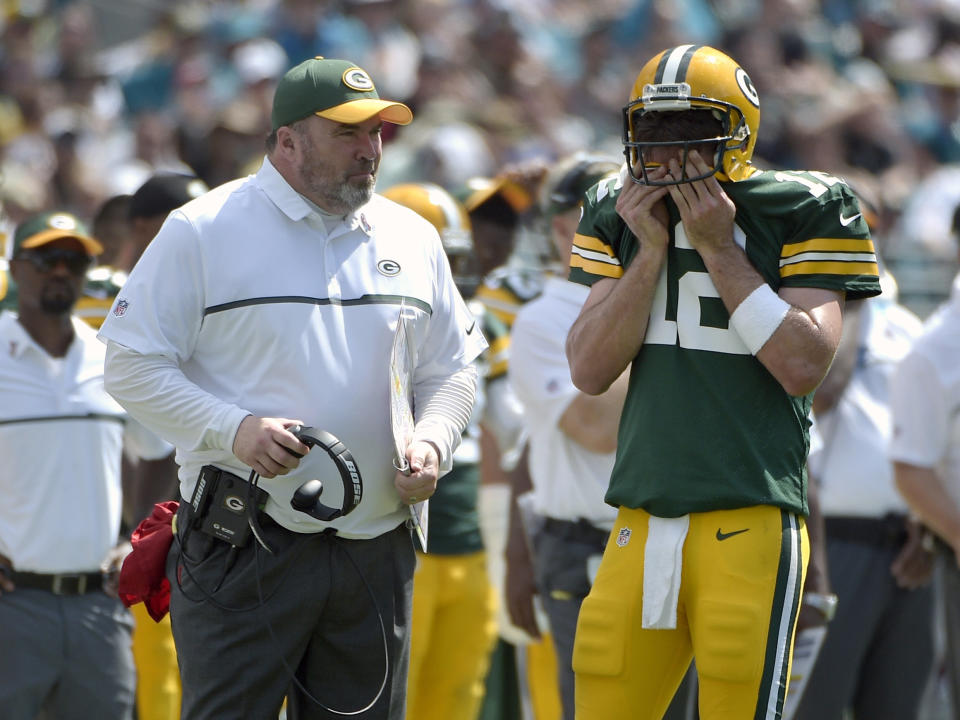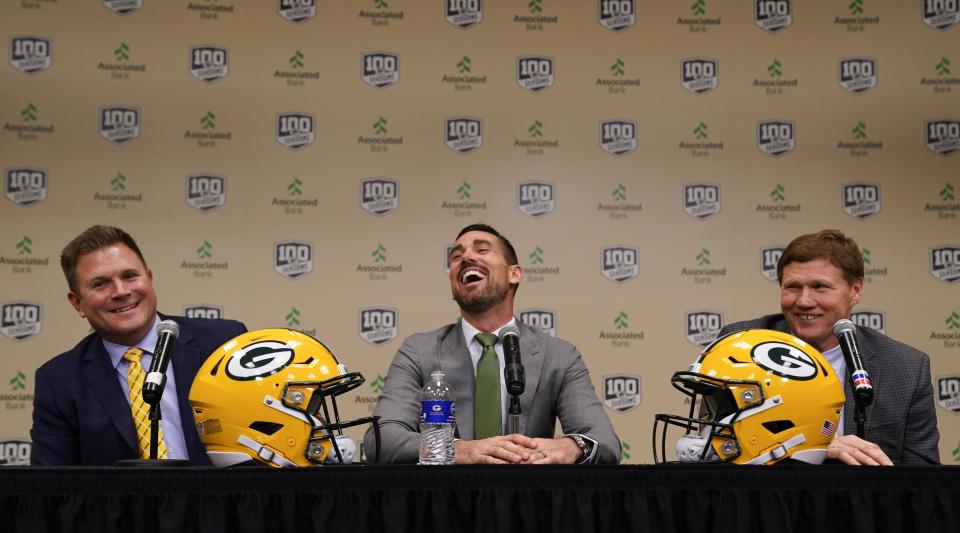In Aaron Rodgers vs. Mike McCarthy, each side lost in widely known Packers feud
Over one year ago, when the New England Patriots were coming off a frustrating Super Bowl loss and the seams of the organization were reportedly stretched to their limits, Robert Kraft went to work.
The Patriots owner had been in this place before with head coach Bill Belichick and quarterback Tom Brady, managing vital organizational cornerstones while reprising roles of counselor, mediator and facilitator. If there were anything Kraft’s decades in the NFL had taught him, especially during his failures with Bill Parcells, it was that a deep bag of diplomacy and open ears were necessities to sustain success. And never more than managing the relationship of a successful head coach and elite quarterback.
As Kraft would say later, “In any successful business, in a marriage, if you have a good relationship, there’s going to be things where you disagree. But hopefully you come together and you have a meeting of the minds and you discuss things.”
That kind of perspective is what the Green Bay Packers lacked the past several years. And that’s what I thought about when I read the latest volume of the now encyclopedic fallout between quarterback Aaron Rodgers and former head coach Mike McCarthy. This was an organization that needed a seasoned, respected and authoritative leader who could force the two sides to air their grievances in real time, rather than behind each other’s backs – or worse yet, in a spiteful autopsy where other people grasp to pin the blame on someone.

I don’t cover the Packers every day, however, I know enough people who have been inside that organization – or who count McCarthy or Rodgers as friends – to say that both men had a hand in their failed relationship. Both are to blame for some of the struggles. And neither should escape blame in the long lens of history. But both also lacked something that often keeps the most stressful of NFL relationships on the rails in the worst of times: Someone with the respect and authority to step up and say …
Cut the b.s.
State your grievances.
Get on the same page and move forward.
The kind of thing a strong team owner would say, if the Packers actually had one of those. Or in the absence of that commanding ownership voice, the kind of authoritative mediation that Bob Harlan and Ron Wolf brought to the Mike Holmgren and Brett Favre era. Specifically, guys who can not only identify a simmering problem, but who can also force two grown men like Rodgers and McCarthy to see the path in front of them. Either they honestly confront each other with the issues at hand and start rowing in the same direction, or they silently snipe behind each other’s backs while the ship sinks.
For a few years in Green Bay, there has been more sinking than rowing. That’s why McCarthy was ultimately fired in an unceremonious manner. It’s also why Rodgers has earned a less-than-flattering reputation for his role in that firing. People who have come out of that organization almost always fall in one camp or the other: Believing the problems have long been created by Rodgers’ unchecked power, or certain that McCarthy’s lack of accountability and adaptability undercut one season after another.
As always in this kind of NFL soap opera, the truth falls somewhere in the middle. And in the best organizations – the ones that can keep relationships on the right track – it falls on someone to show the coach and the quarterback that this is the case. To have the authority and power to force the two into the same room and then say, “You’re both part of this problem. You’re also both part of the solution.”
For all of the drawbacks of a bad NFL team owner, that kind of power and respect is also part of the immense value when you have a good one. And regardless of what you think about Kraft’s alleged lack of judgment nowadays, there is little argument that his ability to keep Brady and Belichick from going sideways for 20 straight seasons is nothing short of a miracle. Some will say the job is easier because of all the winning. But Packers fans should know better. Winning Super Bowls only adds fuel to the ego. And egos are often a major player in closing Super Bowl windows prematurely.
Green Bay could have used that kind of voice when the problems started to fester between McCarthy and Rodgers. But it didn’t have it – either because former general manager Ted Thompson simply wasn’t built (or empowered) to be that kind of mediator, or CEO Mark Murphy didn’t see this problem coming to the kind of crossroads that developed last season. Maybe it was both.
Whatever it was, the prolonged deterioration without an intervening voice is exactly how you ended up with Bleacher Report’s recent revelations. Regardless of what gets disputed, it struck me as an accurate depiction of what a lot of people who were inside the Packers departed believing. And there have been a lot of departures in the middle of this whole mess, from players to coaches to executives. And some of them have been fairly talkative about the situation in Green Bay. So much so, there were quotes in the Bleacher Report piece that seemed familiar. McCarthy being late or missing meetings? It wasn’t the first time I have heard that, although the massage angle was certainly a new twist. Rodgers being extremely hard on surrounding skill position players? Also not a new revelation, although in fairness, I have heard these kinds of stories about almost every elite quarterback.
But the overall point – casting light on the lengthy dysfunction between the coach and quarterback – is definitely a theme that has resonated in Green Bay for a while. And it has stretched to many corners of the NFL, largely because McCarthy has a lot of friends across the league and Rodgers has relationships with most of the top level quarterbacks in (and out of) the game. They’re two guys with no shortage of backers. And that has made the peaks and valleys of their relationship popular gossip on the league’s offseason circuit.

I think of one particular story when new coach Matt LaFleur took the job with the Packers. Shortly after, I called a source with the Tennessee Titans to ask about LaFleur and also gauge the organization’s thoughts on his departure. The source said good things, but also admitted some inside the Titans were surprised LaFleur landed a head coaching job so quickly. Near the end of the call, the source had his own question: Were Green Bay’s problems more about McCarthy or Rodgers?
Months later, we’re still picking at that question. And more than ever, I’m certain it was a shared failure. One that was probably inevitable if only because the franchise lacked the one thing that mattered most: Someone in power who could make two grown men work out their issues when they refused to do it on their own.
More from Yahoo Sports:

